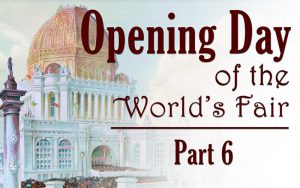
Reading of “The Prophecy”
This is Part 6 of our series “Opening Day of the World’s Fair,” which explores the events of May 1, 1893, at the World’s Columbian Exposition in Chicago. The full series can be found here.
At the conclusion of Reverend Milburn’s invocation, General-Director George R. Davis again commanded the attention of the crowd and announced the third number on the program. “I introduce to you Miss Jessie Couthoui, who will read the poem.”
With faultless enunciation and manner
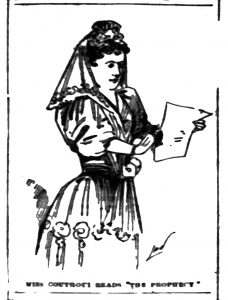
“Miss Couthoui Reads ‘The Prophecy'” from the Chicago Herald, May 2, 1893.
Coming forward was an American woman who looked every inch the Castillian. Miss Couthoui was habited in black, her costume being an appropriate and artistic blending of ancient and modern fashions. Her headdress was of the old Castillian style and was formed of rich Spanish lace. Interwoven with the filmy black were red, yellow, and white roses, the colors of Aragon.
A popular Chicago recitationist and elocutionist of national reputation, Miss Couthoui advanced to the speaker’s stand to recite the poem of the day. She stopped at the velvet-covered desk where rested the telegraphic key, which—when pressed by the President’s finger—was to set in motion the massive machinery.
In a voice clear and distinct and with a faultless enunciation and manner, Miss Couthoui read “The Prophecy,” a poem by W. A. Croffut.
Ode and author
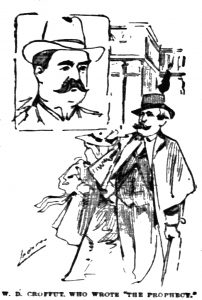
“W. D. [sic] Croffut, Who Wrote ‘The Prophesy'” from the Chicago Herald, May 2, 1893.
Croffut’s ode, written specifically for the opening of the Columbian Exposition, was included in his poetry collection The Prophecy and Other Poems (Lovell, 1894). Some minor changes between this published version and the text of the poem read on Opening Day and recorded in contemporary newspapers are noted below.
At 933 words, “The Prophecy” is substantially shorter than Harriet Monroe’s “Columbian Ode” that was read during the Columbian Exposition Dedication Day ceremonies the previous October. Running 2994 words, Monroe’s poem made for a painfully long oration.
While making no pretentions to an exalted poetical flight, “The Prophecy” was in admirable keeping with the nature of the occasion. Its motive was that period in the famous voyage when the crew was on the eve of mutiny, the vision of the future Columbus saw, and his order to his Captains to keep on their course. Though approaching the ballad style, the ode is characterized by dignity and spirit and is musical and smoothly flowing in its structure.

“The Prophecy”
[Alternate wording used on Opening Day shown in brackets]
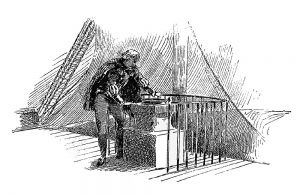 Sadly Columbus watched the nascent moon
Sadly Columbus watched the nascent moon
Drown in the Gloomy Ocean’s western deeps.
Strange birds that day had fluttered in the sails,
And strange flowers floated round the wandering keel,
And yet no land. And now, when thro the dark
The Santa Maria leaped before the gale,
And angry billows tossed the caravels,
As to destruction, Gomez Rascon came
With Captain Pinzon thro the frenzied seas,
And to the Admiral brought a parchment scroll,
Saying. “Good Master: Read this writing here;
An earnest prayer it is from all the fleet.
The crew would fain turn back in utter fear.
No longer to the Pole the compass points.
The sailor’s star reels dancing down the sky.
You saw but yestereve [yesterday] an albatross
Drop dead on deck beneath the flying scud.
The Devil’s wind blows madly from the east
Into the land of Nowhere, and the sea
Keeps sucking us adown the maelstrom’s maw.
Francisco says the edge of earth is near,
And off to Erebus we slide unhelmed.
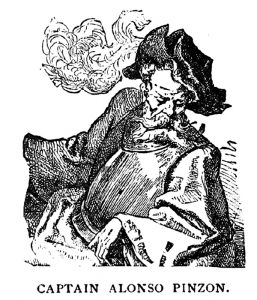 Last Sunday night Diego saw a witch
Last Sunday night Diego saw a witch
Dragging the Nina by her forechains west
And wildly dancing on a dolphin’s back;
And, as she danced, the brightest star in heaven
Slipped from its leash and sprang into the sea,
Like Lucifer, and left a trail of blood.
O, Master, hear me! [I pray thee, master,]— turn again to Spain,
Obedient to the omens, or, perchance,
The terror-stricken crew, to escape their doom,
May mutiny and—”
“Gomez Rascon, peace!”
Exclaimed the Admiral, “thou hast said enough!
Now, prithee, leave me. I would be alone.”
Then eagerly Columbus sought a sign,
In sea and sky and in his lonely heart,
But found, instead of presages of hope,
The black and ominous portents of despair.
The wild wind roared around him, and he heard
Shrill voices shriek ” Return!— return! — return!”
He thought of Genoa and dreams of youth,
His father’s warning and his mother’s prayers,
Confiding Beatriz, her prattling babe,
The life and mirth and warmth of old Castile,
And tempting comfort of the peaceful land,
And sad winds moaned “return!— return!—return!”
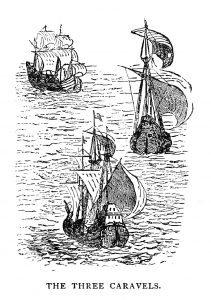 As thus he mused, he paced the after deck
As thus he mused, he paced the after deck
And gazed upon the luminous waves astern.
Strange life was in the phosphorescent foam,
And thro the goblin glow there came and went,
Like elfin shadows on an opal sea,
Prophetic pictures of the laud he sought.
He saw the end of his victorious quest.
He saw, ablaze on Isabella’s breast,
The gorgeous Autillean jewels rest—
The Islands of the West!
He saw invading Plenty dispossess
Old Poverty, the land with bounty bless,
And thro the wailing caverns of Distress
Walk star-eyed Happiness!
He saw the Bourbon and Braganza prone,
For ancient error tardy to atone,
Giving the plundered people back their own
And flying from the throne.
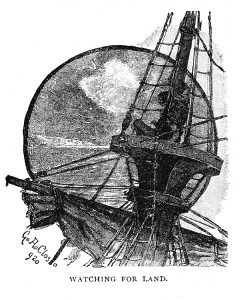 He saw an empire radiant as the day,
He saw an empire radiant as the day,
Harnessed to law but under Freedom’s sway,
Proudly arise, resplendent in array,
To show the world the way.
He saw celestial Peace in mortal guise,
And, filled with hope and thrilled with high emprise,
Lifting its tranquil forehead to the skies,
A vast republic rise.
He saw, beyond the hills of golden corn,
Beyond the curve of Autumn’s opulent horn,
Ceres and Flora laughingly adorn
The bosom of the morn.
He saw a cloth of gold across the gloom,
An arabesque from Evolution’s loom,
And from the barren prairie’s driven spume
Imperial cities bloom.
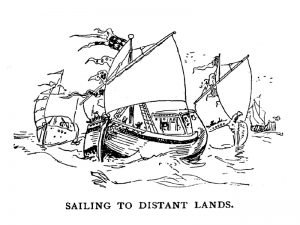 He saw an iron dragon dashing forth
He saw an iron dragon dashing forth
On pathways East, and West, and South and North,
Its bonds uniting in beneficent girth
Remotest ends of earth.
He saw the lightnings run an elfin race,
Where trade and love and pleasure interlace,
And severed friends in Ariel’s embrace
Communing face to face.
He saw Relief thro deadly dungeons grope;
Foes turn to brothers, black despair to hope,
And cannon rust along the grass-grown slope,
And rot the gallows rope.
He saw the babes on Labor’s cottage floor,
The bright walls hung with luxury more and more,
And Comfort, radiant with abounding store,
Wave welcome at the door.
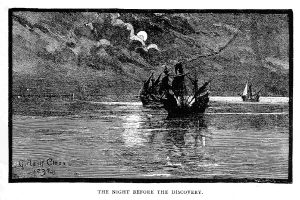 He saw the myriad spindles flutter round;
He saw the myriad spindles flutter round;
The myriad mill-wheels shake the solid ground;
The myriad homes where jocund joy is found,
And Love is throned and crowned.
He saw exalted Ignorance under ban.
Though panoplied in force since time began,
And Science, consecrated, lead the van,
The Providence of man.
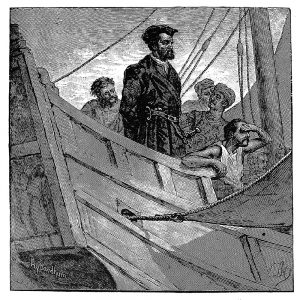 The pictures came and paled and passed away.
The pictures came and paled and passed away.
And then the Admiral turned as from a trance,
His lion face aglow, his luminous eyes
Lit with mysterious fire from hidden suns:
“Now, Martin, to thy waiting helm again!
Haste to the Pinta! Fill her sagging sails,
For on my soul hath dawned a wondrous sight.
Lo! — thro this segment of the watery world
Uprose a hemisphere of glorious life!—
A realm of golden grain and fragrant fruits,
And men and women wise and masterful,
Who dwelt at peace in rural cottages
And splendid cities bursting into bloom—
Great lotus blossoms on a flowery sea.
And happiness was there, and bright-winged Hope—
High Aspiration, soaring to the stars!
And then methought, O, Martin, through the storm
A million faces turned on me and smiled.
Now go we forward—forward!—fear avaunt!
I will abate no atom of my dream,
Though all the devils of the underworld
Hiss in the sails and grapple to the keel!
Haste to the Pinta! Westward keep her prow,
For I have had a vision full of light!
Keep her prow westward in the sunset’s wake
From this hour hence and let no man look back!”
Then from the Pinta’s foretop fell a cry —
A trumpet-song—“Light-ho! Light-ho! Light-ho!”
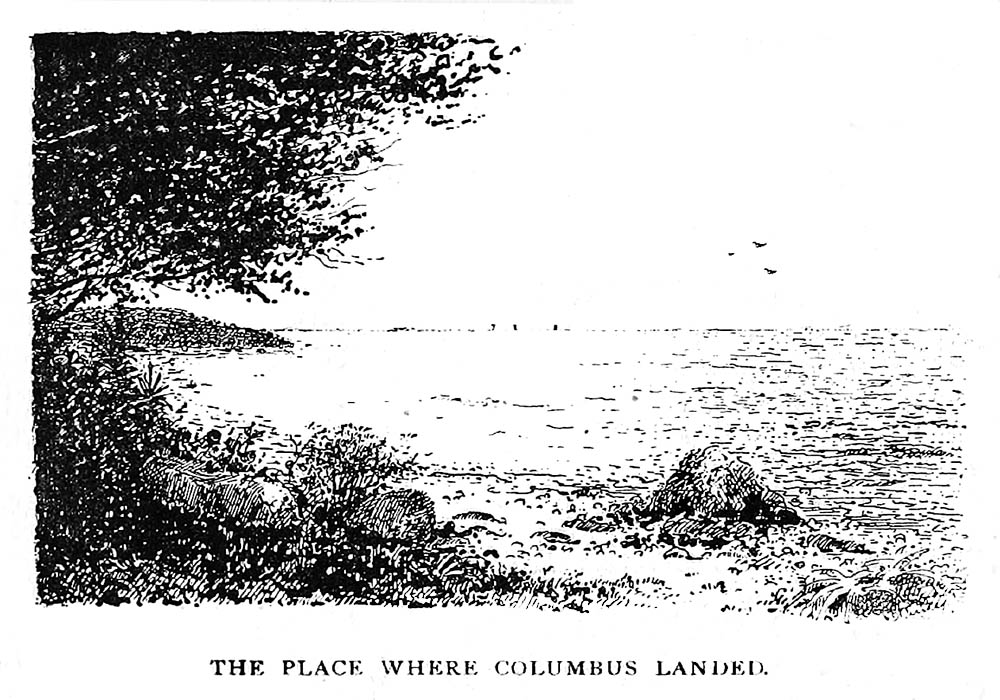
[Images from The True Story of Christopher Columbus, called the Great Admiral by Elbridge S. Brooks (D. Lothrop Co., c1892); public domain.]
The voice of a child in a tornado
Spectators waited patiently as Miss Couthoui worked her way through the printed sheets. Few heard any of the poem. At the conclusion of the recitation, however, a roar of applause characteristic of Americans—warm, hearty and voluminous—erupted from the masses below the grandstand. From behind her, Miss Couthoui received vociferous applause. On retiring, several prominent ladies of the presidential circle warmly complimented her oration.
A reporter for the Inter Ocean commented that “the young lady delivered the lines in clear, impressive tones, and was heard at a considerable distance.” Other papers were less generous, describing Miss Couthoui as a “delicate young woman whose enunciation was perfect but whose voice, of course, was lost to all except the immediate circle.” The Tribune wrote that, while “the young woman, with her earnest manner and graceful gestures, was a pretty sight to look upon,” it was doubtful if even President Cleveland, seated three feet behind her, could have heard her voice. “Her voice is like the voice of a child in a tornado,” they added. “Mere pantomime,” reported the Chicago Herald for “a paltry three thousand or so.”
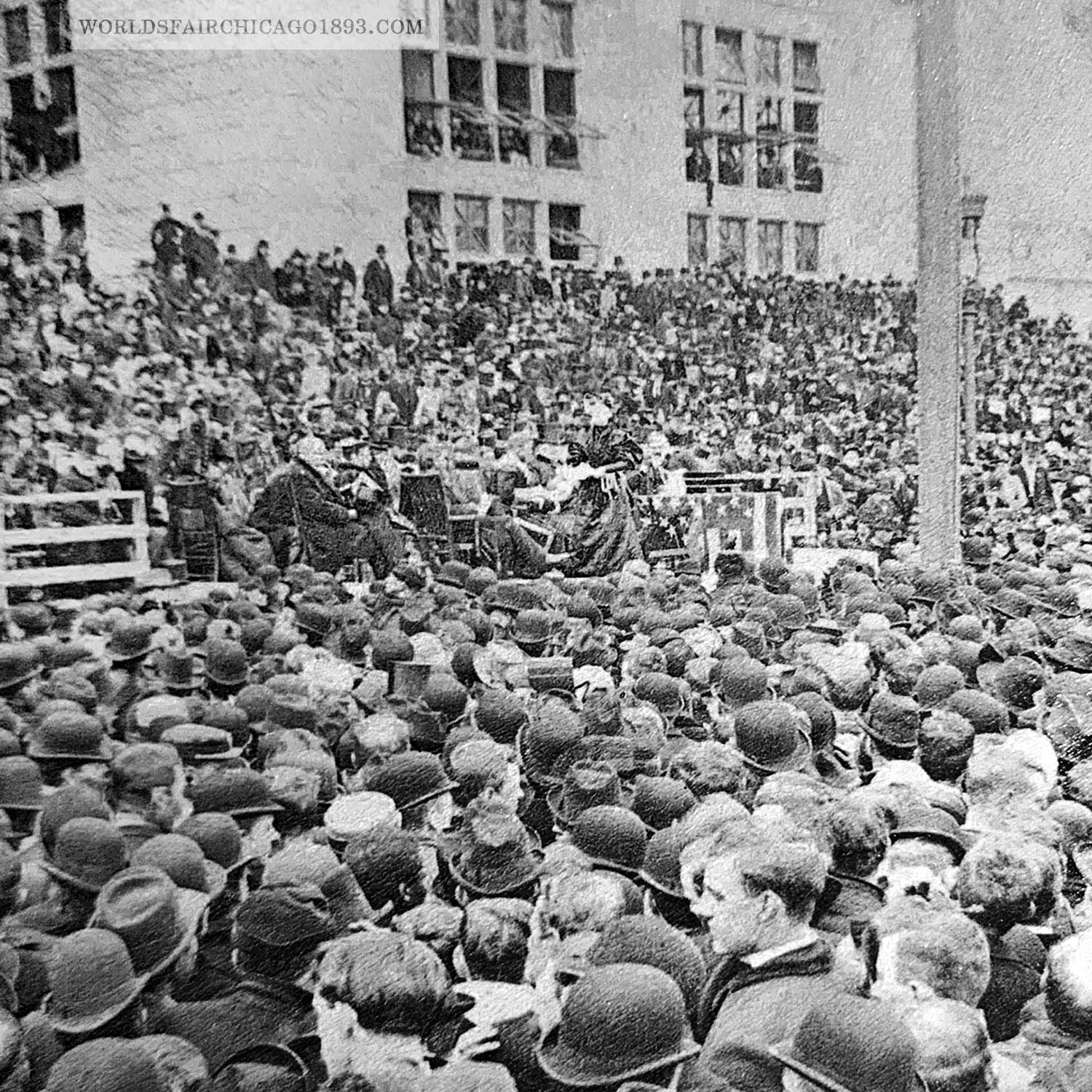
“Miss Couthoui Reading Poem at opening, Columbian Exposition” stereoscope card photograph (B. W. Kilburn, 1893).
SOURCES
(See our note about sources here.)
Chicago Daily Tribune May 2, 1893, p. 12.
Dedicatory and Opening Ceremonies of the World’s Columbian Exposition. Stone, Kastler & Painter, 1893, p. 259.
“Epoch in History” Chicago Herald May 2, 1893, p. 1.
“How it was Opened” Chicago Inter Ocean May 2, 1893, p. 1-2.
“Opening Ceremonies World’s Columbian Exposition” in Columbian Exposition Dedication Ceremonies Memorial. Metropolitan Art Engraving & Publishing Company, 1893, pp. 212-224.
“Ready for a World” Chicago Daily Tribune May 2, 1893, p. 1.
“Viewed from Above” Chicago Daily Tribune May 2, 1893, p. 5.
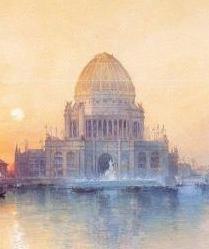
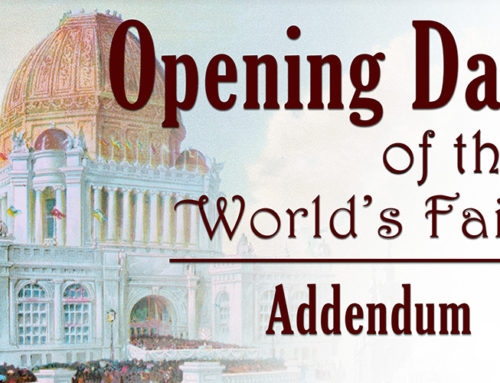
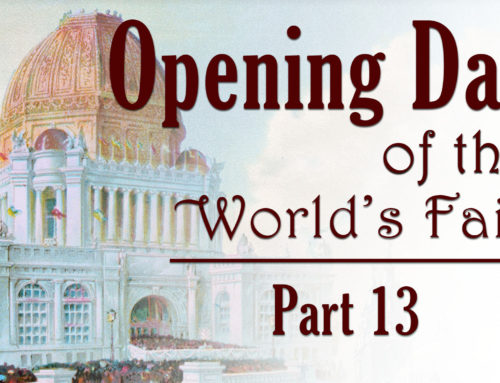
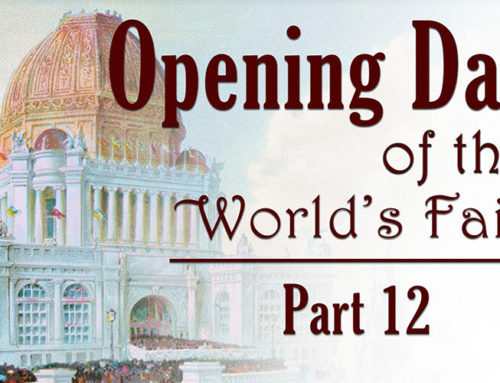
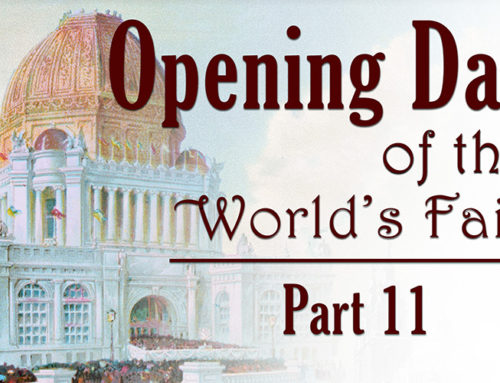
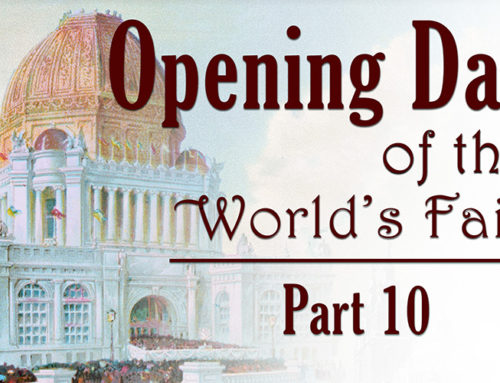
Leave A Comment